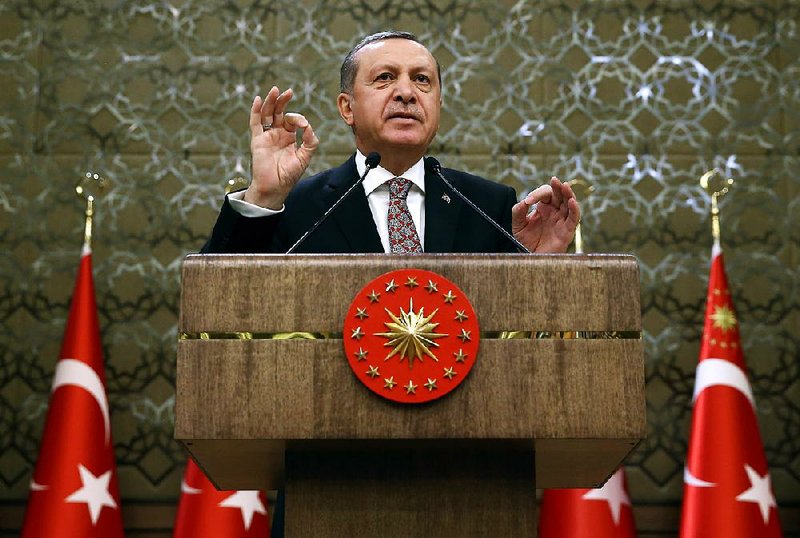KILIS, Turkey -- Turkey's leaders lashed out Wednesday at the United Nations and others who are pressing the country to open its border to thousands more Syrian refugees, accusing them of failing to shoulder the refugee burden or stop the Russian bombings that have triggered the exodus.
The civil war in Syria has killed more than 250,000 people and forced millions to flee their homes since it began in 2011. In recent days, a Russian-backed Syrian government offensive around the city of Aleppo has sent tens of thousands of people fleeing to the Turkish border.
Turkey has taken in some 3 million refugees -- including more than 2.6 million Syrians -- making it the country with the world's largest refugee population. Turkey has not, however, allowed in the latest wave of refugees, providing them instead with assistance at camps on the Syrian side of the border.
That prompted the U.N. refugee agency on Tuesday to call on Turkey to admit "all civilians who are fleeing danger and seeking international protection."
At a news conference Wednesday with his Dutch counterpart in The Hague, Turkish Prime Minister Ahmet Davutoglu called the U.N. Security Council and the international community "two-faced" for demanding that Turkey open its borders while not moving "a finger to solve the Syrian crisis" or to stop the Russian bombings.
Davutoglu also said the Syrian and Russian military operations were an attempt to drive out people who don't support the government of Syrian President Bashar Assad. By taking in the refugees that have fled Aleppo, he said Turkey would be indirectly contributing to what he called Syria's "ethnic cleansing."
"With every refugee that we accept, in a way, we would be contributing to this ethnic cleansing aim," Davutoglu said. "If this is a strategy to change the demography in Syria, then we all have to be vigilant against it."
In Ankara, Turkish President Recep Tayyip Erdogan said the U.N. had sent $455 million to Turkey to help with refugees but that his country had spent $10 billion on them since 2011.
"What does the U.N. say? 'Open your border to the refugees.' What are you for then? What is your use?" Erdogan asked. "We have taken 3 million Syrians and Iraqis into our home until now. How many did you take?"
Turkey's Oncupinar border crossing, opposite the Bab al-Salameh gate in Syria, has been closed since Friday, with only ambulances and aid trucks being allowed to cross.
Davutoglu on Wednesday also warned of a looming humanitarian disaster after Russian and Syrian military operations closed a vital humanitarian aid corridor between Turkey and Aleppo.
"The corridor has been closed because of the attacks of these barbaric forces," Davutoglu said. "If this corridor is not opened, hundreds of thousands of Syrians who don't have the opportunity to reach Turkey face hunger."
Dutch Prime Minister Mark Rutte said his country appreciated the "very careful way of working Turkey chooses to prevent an uncontrolled entry" of refugees from Syria. He said the Netherlands and Germany had offered to help the refugees on the Turkish side of the border.
"Finger-pointing serves no purpose," he said. "I believe that Turkey has a sensible policy here."
Meanwhile, Kurdish fighters helped by Russian airstrikes attacked in northern Syria on Wednesday in an attempt to capture a military air base held by Syrian insurgents.
Syria's Kurds have been among the most effective forces battling the Islamic State extremist group, but have remained largely neutral in the conflict between Assad and the rebels fighting to overthrow him.
But with Syrian troops backed by Russian warplanes striking near Aleppo and the Turkish border, the Kurds appeared to be exploiting the chaos to expand their nearby enclave, known as Afrin.
Maj. Yasser Abdul-Rahim, a rebel commander in Aleppo province, said fighters from the Kurdish People's Protection Units are clashing with rebels near Mannagh air base. He accused the group of trying to take Arab villages near Afrin.
"We are fighting on three fronts," he said via Skype, referring to the People's Protection Units, Syrian troops and the Islamic State, which also controls parts of Aleppo province. He warned that Mannagh air base could fall to Kurdish fighters because of the Russian air cover and the intensity of the attack.
The Britain-based Syrian Observatory for Human Rights also said fighters with the People's Protection Units are trying to capture the former Syrian air base, which fell to the opposition in August 2013.
Ahmad al-Ahmad, an opposition activist based in Aleppo province, said the fighting is concentrated outside the air base and that Russian warplanes are bombarding the area. He said the Kurdish fighters also are trying to push their way toward the nearby village of Kfar Naya. "The front in northern Aleppo is in flames," he said via Skype.
Kurdish forces in Afrin could not be reached for comment.
Information for this article was contributed by Mike Corder, Bassem Mroue, Albert Aji and Edith M. Lederer of The Associated Press.
A Section on 02/11/2016
